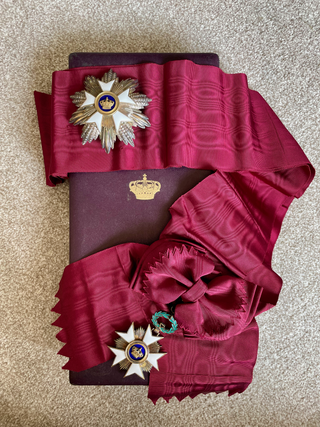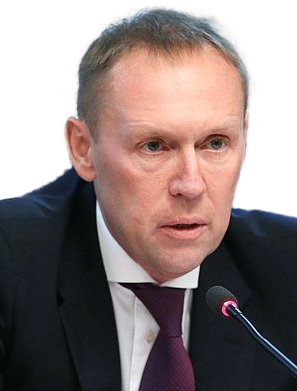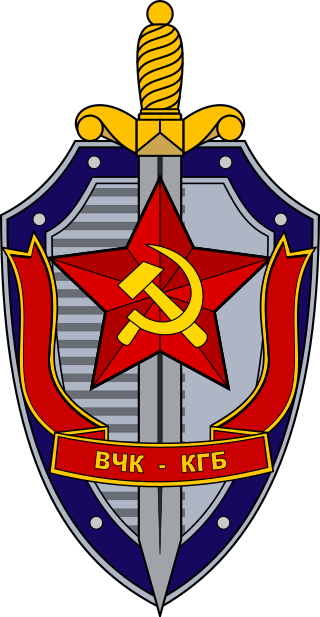External links
On French Wikipedia:
Albert Raes (Bruges 21 February 1932) was a Belgian magistrate and was head of the Belgian Security Services from 1977 until 1990.
Raes is the son of Firmin Raes, who was an executive at the train and railway manufacturer La Brugeoise and the chief of the Chamber of Rhetoric De Drie Santinnen. Albert Raes is married and has two daughters.
He finished his secondary school at the Sint-Lodewijks College in Bruges (rhetorics 1951) and continued at the University of Louvain. He graduated in 1955 as a doctor of law.
In 1955 he organized a congress in Bruges on behalf of the Nouvelles Equipes Internationales, the group of Christian democratic parties in Europe, predecessor of the European Christian-democratic party (EVP). He also organized a gathering of the European Young Christian Democrats. He completed his military service at the First Regiment of Horse Guards and ended as a reserve officer. Back in Bruges, he started working at the offices of the Officer of public prosecution.
Soon he was made a private secretary of minister Albert De Gryse (PTT). He continued as member of the staff of the ministers Arthur Gilson (Home Office), André Dequae (Finances), Pierre Wigny (Justice) and Paul-Willem Segers (Defense). In the meantime he was appointed as prosecutor at the courts in Courtrai and Bruges.
In 1969 he was appointed assistant administrator-general of the Belgian Security services, under Ludovic Caeymaex, to who he succeeded in 1977. He remained in this capacity until June 1990.
Under the directorship of Raes, the Belgian secret services continued the battle against all things considered as subversive, amongst others:
From 1977 to 1990 Raes was the dean of the Club of Bern, of which he was a co-founder in 1970. The heads of the secret services of a dozen European countries, including Switzerland, met regularly to exchange information and evaluate sensible dossiers.
During the years 1970 and 1980 the Belgian Security services encountered regularly controversy. Allegations of malfunctioning were made, although never substantiated.
For a number of years a minor problem was generated by small extreme right-wing groups, such as Westland New Post and Front de la Jeunesse. Some of the infiltrations by informants or members of the Security were put into question. A parliamentary inquiry followed.
Raes was pursued meanwhile by the baron Benoît de Bonvoisin, who accused him of being a KGB agent and of having wrongly accused the baron as an agitator of the extreme right. The different claims made by Bonvoisin remained unproven and lead to nothing.
With a sentence of November 10, 2009 Eric Van de Weghe and Christian Amory were condemned for having sold forged documents to de Bonvoisin, enabling him to claim that Raes was a KGB-agent. The judgment said: 'It is without doubt that the falsified documents were transmitted by de Bonvoisin to the Belgian police authorities with the purpose of harming Albert Raes'. De Bonvoisin was not condemned because serious health problems prevented him from appearing in court. Van den Weghe was condemned to 9 months imprisonment and Amory to two months.
As for the extreme left, the Security Services and Albert Raes had to fight the Cellules Communistes Combattantes (CCC) of Pierre Carette, which perpetrated bomb attacks resulting in 1984-1985 in two deaths and several severely injured victims. The secret services succeeded in arresting them and in making them condemned to long prison sentences.
At the end of his career, Raes was confronted with disputes about the Belgian stay-behind network, as a result of the dysfunction of parts of a similar organization in Italy. It appeared that in other countries, including Belgium, such dysfunctions had not taken place.
In June 1990, the then minister of Justice Melchior Wathelet removed Raes from the secret services and appointed him in the purely honorary function of deputy secretary general of the ministry of Justice.
The minister was however forced in 1993 by the Conseil d'Etat to appoint Raes in a function equivalent to his previous one, and he became director general for Legislation and Cults within the Ministry of Justice, remaining in this function until his retirement in 1997.
Of this removal, the former minister of Justice Jean Gol wrote: My successor sacrificed this high ranking civil servant ("ce grand commis") to a sort of "raison d'Etat", made out of a mixture of socialist rancour and the concern of protecting his own image. I had always refused to sanction the administrator-general, who was the victim of the gossip by journalists in pursuit of juicy scoops, by victims of a persecution complex, and by condemned criminals. Two parliamentary commissions and numerous judicial inquiries revealed nothing which could have tarnished the reputation of this public servant (Librement, p. 167).
Raes was a member of the board of the 'Carnegie Hero Fund'.
In 2000 he was made an honorary consul of Morocco for the Flemish region. From 2001 till 2011 he was vice-president of the consular corps in West-Flanders.
He is an honorary member of the Fraternelle des agents parachutists belges 1940-1945.
Albert Raes was made:
On French Wikipedia:

Aleksander Kwaśniewski is a Polish politician and journalist. He served as the President of Poland from 1995 to 2005. He was born in Białogard, and during communist rule, he was active in the Socialist Union of Polish Students and was the Minister for Sport in the Communist government during the 1980s. After the fall of Communism, he became a leader of the left-wing Social Democracy of the Republic of Poland, a successor to the former ruling Polish United Workers' Party, and a co-founder of the Democratic Left Alliance.
Oleg Danilovich Kalugin is a former KGB general. He was during a time, head of KGB political operations in the United States and later a critic of the agency. After being convicted of spying for the West in absentia during a trial in Moscow, he remained in the US and was sworn in as a citizen on 4 August 2003.

The Order of Leopold is one of the three current Belgian national honorary orders of knighthood. It is the oldest and highest order of Belgium and is named in honour of its founder, King Leopold I. It consists of a military, a maritime and a civil division. The maritime division is only awarded to personnel of the merchant navy, and the military division to military personnel. The decoration was established on 11 July 1832 and is awarded by Royal order.

The Order of the Crown is a national order of the Kingdom of Belgium. The Order is one of Belgium's highest honors.
Operation Gladio was the codename for clandestine "stay-behind" operations of armed resistance that were organized by the Western Union (WU), and subsequently by NATO and the CIA, in collaboration with several European intelligence agencies during the Cold War. The operation was designed to minimize the potential of an invasion of Western European countries by Warsaw Pact governments. Although Gladio specifically refers to the Italian branch of the NATO stay-behind organizations, "Operation Gladio" is used as an informal name for all of them. Stay-behind operations were prepared in many NATO member countries, and some neutral countries.
Jerzy Wojciech Łukaszewski was a Polish and Belgian academic and diplomat. He lived in Belgium from 1960 on, where he taught at the College of Europe in Bruges from 1961 and served as its rector from 1972. From 1990 to 1996, he was Polish ambassador to France.

A strategy of tension is a political policy wherein violent struggle is encouraged rather than suppressed. The purpose is to create a general feeling of insecurity in the population and make people seek security in a "strong government".

Felice Casson is an Italian magistrate and politician, who discovered the existence of Operation Gladio, a "stay-behind" NATO anti-communist army during the Cold War, while investigating on the Peteano bombing in 1972, for which two neo-fascists were convicted; the explosives used in the attack supposedly came from a NATO arms cache. 622 Gladio members, including two people who served as prime minister and president, were exposed in the course of the investigation.
Benoît, Baron de Bonvoisin is a Belgian far right activist.
Westland New Post (WNP) was a short-lived Belgian extreme right-wing organization founded in March 1981 by Paul Latinus and members of the Front de la Jeunesse (FJ). The organization ceased to exist after the Front de la Jeunesse disbanded in 1983 and Paul Latinus was found dead in his girlfriend's home in April 1984.
The Belgian stay-behind network, colloquially called "Gladio", was a secret mixed civilian and military unit, trained to form a resistance movement in the event of a Soviet invasion and part of a network of similar organizations in North Atlantic Treaty Organization states. It functioned from at least 1951 until 1990, when the Belgian branch was promptly and officially dissolved after its existence became publicly known following revelations concerning the Italian branch of the stay-behind network.

Andrey Konstantinovich Lugovoy, also spelled Lugovoi, is a Russian politician and businessman and deputy of the State Duma, the lower house of the Russian parliament, for the LDPR. He worked as a KGB bodyguard and as head of "Ninth Wave", a security firm.
Projekt-26, best known as P-26, was a stay-behind army in Switzerland charged with countering a possible invasion of the country. The existence of P-26 as secret intelligence agencies dissimulated in the military intelligence agency (UNA) was revealed in November 1990 by the PUK EMD Parliamentary Commission headed by senator Carlo Schmid. The commission, whose initial aim was to investigate the alleged presence of secret files on citizens constituted in the Swiss Ministry of Defence, was created in March 1990 in the wake of the Fichenaffäre or Secret Files Scandal, during which it had been discovered that the federal police, BUPO, had maintained files on 900,000 persons.

Robert Herman Alfred de Foy CBE was a Belgian magistrate, and head of the Belgian State Security Service, during the occupation of Belgium by the Nazis. This period of his life has led to considerable historical debate around de Foy's legacy, but in the post-war period he returned to his pre-war position, was decorated Grand Officer of the Order of Leopold II, and recognised as "Righteous Among the Nations" by the state of Israel.
The Chamber of Representatives, the lower house of the Belgian Federal Parliament, has the right to conduct parliamentary inquiries pursuant to article 56 of the Belgian Constitution, which provides that "Each Chamber has the right of inquiry". The Senate also had a right to enquiry until 2014. Committees of inquiry were rarely set up until 20 years ago, and have been used increasingly in the recent past, dealing with matters deemed of major public concern or apparent governmental failure.
The Central Intelligence Agency (CIA) has been involved in Italian politics since the end of World War II. The CIA helped swing the 1948 general election in favor of the centrist Christian Democrats and would continue to intervene in Italian politics until at least the early 1960s.

The Committee for State Security (CSS) (KGB; Russian: Комитет государственной безопасности (КГБ), romanized: Komitet gosudarstvennoy bezopasnosti, IPA: [kəmʲɪˈtʲet ɡəsʊˈdarstvʲɪn(ː)əj bʲɪzɐˈpasnəsʲtʲɪ](listen)) was the main security agency for the Soviet Union from 13 March 1954 until 3 December 1991. As a direct successor of preceding agencies such as the Cheka, GPU, OGPU, NKGB, NKVD and MGB, it was attached to the Council of Ministers. It was the chief government agency of "union-republican jurisdiction", carrying out internal security, foreign intelligence, counter-intelligence and secret police functions. Similar agencies operated in each of the republics of the Soviet Union aside from the Russian SFSR, where the KGB was headquartered, with many associated ministries, state committees and state commissions.

Enzo Moavero Milanesi is an Italian independent politician and law professor who served as Minister of Foreign Affairs in the first Cabinet of Giuseppe Conte from 1 June 2018 to 5 September 2019. He was also the Chairman-in-Office of the Organization for Security and Co-operation in Europe during the Italian Chairmanship of the organisation in 2018. He previously served as Deputy Secretary-General of the European Commission (2002–2005) and as Italy's Minister of European Affairs in the Monti Cabinet and the Letta Cabinet from 16 November 2011 to 22 February 2014. He is a graduate of the College of Europe.

Belgium–Spain relations are the bilateral relations between Belgium and Spain. Belgium has an embassy in Madrid and four consulates general in: Madrid, Barcelona, Santa Cruz de Tenerife and Alicante. Spain has an embassy and a consulate in Brussels. The relations between both countries are defined mainly by their membership in the European Union and by being allies in NATO, as well as belonging to numerous international organizations, which makes their relations have ample development in the framework of them.